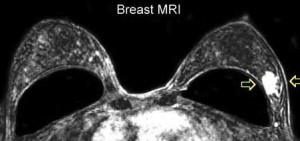When one combines the number of elective breast augmentations performed and the incidence of breast cancer occurrence, it is no surprise that the two would intersect. While ultrasound and mammography are excellent breast cancer screening tools they are not perfect and not every tumor will be detected. Magnetic resonance imaging (MRI) is a well known ‘higher level’ breast imaging modality as it is better at detecting soft tissues due to its higher spatial resolution. Since a breast implant compresses the surrounding breast tissues, MRI can be argued to be a better tumor detector.

This study showed that breast cancers often contacted the implant or the pectoralis major muscle with growth abutting the implant more frequently in breasts in which the implants were in the subglandular position than in the submuscular position. MRIs were also able to detect a greater extent of breast cancer than mammography or ultrasound in almost half the patients studied. 40% of cases. However, an MRI is still not a great screening technique since it detected only 1/3 of the primary cancers.
MRIs are very good at detecting silicone breast implant ruptures and determining the location and extent of breast cancers.
Dr. Barry Eppley
Indianapolis, Indiana


